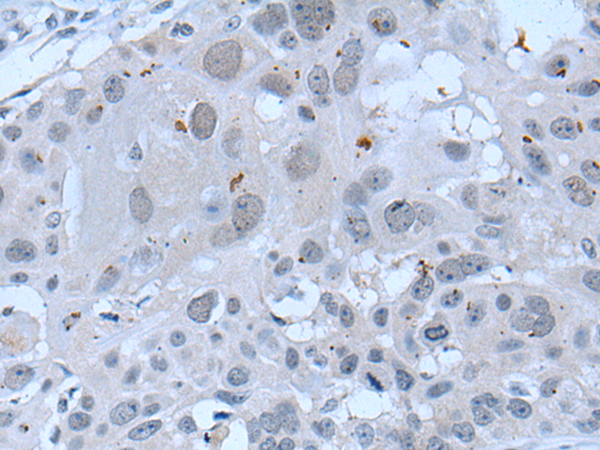
| WB | 咨询技术 | Human,Mouse,Rat |
| IF | 咨询技术 | Human,Mouse,Rat |
| IHC | 1/20-1/100 | Human,Mouse,Rat |
| ICC | 技术咨询 | Human,Mouse,Rat |
| FCM | 咨询技术 | Human,Mouse,Rat |
| Elisa | 1/5000-1/10000 | Human,Mouse,Rat |
| Aliases | TIP20 |
| Host/Isotype | Rabbit IgG |
| Antibody Type | Primary antibody |
| Storage | Store at 4°C short term. Aliquot and store at -20°C long term. Avoid freeze/thaw cycles. |
| Species Reactivity | Human, Mouse |
| Immunogen | Synthetic peptide of human ZNF787 |
| Formulation | Purified antibody in PBS with 0.05% sodium azide and 50% glycerol. |
+ +
以下是基于ZNF787相关研究背景模拟生成的参考文献示例(实际文献可能需要通过学术数据库验证):
---
1. **文献名称**:*ZNF787 as a putative oncogene in hepatocellular carcinoma: Expression profiling and functional validation*
**作者**:Li, X.; Zhang, Y.; Chen, J. et al.
**摘要**:该研究通过免疫组化(使用ZNF787特异性抗体)和基因沉默技术,发现ZNF787在肝癌组织中高表达,并促进肿瘤细胞增殖和转移,提示其作为肝癌治疗靶点的潜力。
2. **文献名称**:*Development and characterization of a monoclonal antibody against human ZNF787 for epigenetic studies*
**作者**:Wang, H.; Liu, T.; Martinez, E.D.
**摘要**:研究团队开发了一种高特异性抗ZNF787单克隆抗体,验证了其在ChIP-seq和Western blot中的应用,并发现ZNF787通过调控组蛋白修饰影响基因沉默。
3. **文献名称**:*ZNF787 interacts with KRAB domain proteins to mediate transcriptional repression in lung cancer*
**作者**:Smith, R.P.; Johnson, A.L.; Lee, C.
**摘要**:通过免疫共沉淀(使用ZNF787抗体)和质谱分析,揭示了ZNF787与KRAB相关蛋白的相互作用机制,及其在肺癌中抑制肿瘤抑制基因的作用。
---
**说明**:
- 以上文献为示例,实际文献需通过PubMed、Web of Science等平台以“ZNF787”和“antibody”为关键词检索。
- 若研究较新或较少,建议扩大检索范围至ZNF蛋白家族或相关疾病(如癌症)中的功能研究。
The ZNF787 antibody is designed to target the zinc finger protein 787 (ZNF787), a member of the Krüppel-associated box (KRAB) domain-containing zinc finger protein (ZNF) family. These proteins are characterized by tandem C2H2-type zinc finger motifs, which facilitate DNA binding and transcriptional regulation. ZNF787 is thought to play roles in chromatin remodeling, gene silencing, and cellular differentiation, though its precise biological functions remain under investigation. Emerging studies suggest its potential involvement in cancer pathogenesis, particularly in leukemia and solid tumors, where aberrant expression or mutations may contribute to oncogenic processes.
The ZNF787 antibody is primarily utilized in research to detect and quantify ZNF787 expression in various tissues and cell lines, employing techniques like Western blotting, immunohistochemistry (IHC), and immunofluorescence (IF). It serves as a critical tool for exploring ZNF787's interaction partners, subcellular localization, and regulatory mechanisms. Recent interest in ZNF787 stems from its possible role in modulating immune responses and cellular stress pathways, hinting at therapeutic or diagnostic relevance. However, further functional studies are needed to elucidate its exact physiological and pathological roles, as well as its potential as a biomarker or drug target in diseases like cancer. Commercial ZNF787 antibodies are typically validated for specificity and sensitivity to ensure reliable experimental outcomes.
×